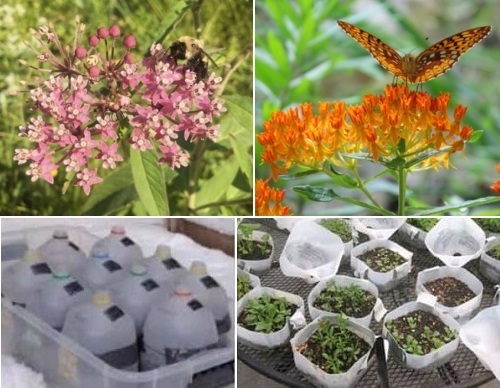Above: If you’d like to have plants in your yard and around the community this summer that support native pollinators, including the ones pictured here, sign up now for the seeds and workshop to get you started sowing them in plastic jugs this winter. (scroll down for photo credits)
The Open Space Preservation Commission is holding another opportunity to be part of their Winter Sow program this year. Register now to pick up free seeds this weekend.
According to organizers, you don’t need a green thumb to participate. (That has me thinking it could be an excellent educational project to work on with kids!)
OSPC is instructing people to get in their seed orders by 3:00 pm this Friday, February 14th. But, the earlier you register, the better chance you have of getting seeds that you want. (Some varieties have already sold out from the last round.)
The OSPC announcement promotes:
you will be amazed with the bounty of native plants even the most inexperienced gardener can grow for their gardens with extras to share with friends. No gardening experience necessary.
As I’ve previously explained, the “Winter Sow” program is part of OSPC’s initiative to support local pollinators (especially endangered ones) by nurturing native plants.
(I’m sharing details and background below. But you can read OSPC’s information on their website here. )
On the seed registration page, OSPC explains:
Our native plants have co-evolved with New England weather patterns and most native plants require a period of repeated freezing and thawing for their seeds to break dormancy and germinate.
Participation means you can set the stage to have beautiful flowers and wonderful plants in your yard this summer while “helping our most at risk pollinators”.
In 2020 Volunteers first got together at public hands-on workshops in Southborough to prepare and sow seeds in the winter and foster them into seedlings ready for planting in the spring. Since then, the program has grown.
Over the years, OSPC has continued to increase the number of native seed varieties they offer. This winter, volunteers prepared seeds to share for over 60 varieties of flowering native plants that are beneficial to native pollinators. As of this morning, they were still able to offer 54.
On the plant list, bloom times are shown as ranging from March – October. More than half of the offered plants are shown as supporting the bumblebee species bombus fervidus and/or bombus vagans. (You can read about the OSPC’s Beecology partnership with a UMass professor to research and support those threatened species here.)
Many of the native plants also attract other native bees, butterflies, hummingbirds, other birds, and/or native caterpillars.
Previously, OSPC Chair Freddie Gillespie highlighted that one of the reasons blamed for a sharp decline in common backyard bird species is the decline in the population of caterpillars they feed on. Many of those caterpillars only/mostly lay eggs on native plants. Given worries about the bird flu’s potential impact, supporting the health of native birds may be another priority for the ecologically minded.
To find the link for the list of offered plants with pictures and details visit their dedicated page on the Town website. (There you will also find a link for seed order signup. On that linked EventBrite page, you’ll need to use the “Reserve a Spot” button to pull up a list of seed options to select under checkout.)
Participants will be able to pickup their seeds on Saturday, February 15th from 12:00 to 1:00 pm. Volunteers will be handing out the packets at a drive-through pickup behind the Southborough Senior Center/Cordaville , 9 Cordaville Road.
There aren’t any more workshops scheduled for sowing seeds at this time. But, if you aren’t familiar with how to do it, OSPC points you to a how to YouTube video.
(images cropped from OSPC program materials and communications, top L-R attributed to Freddie Gillespie and Dawn Vesey)


